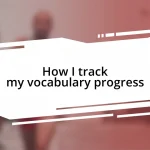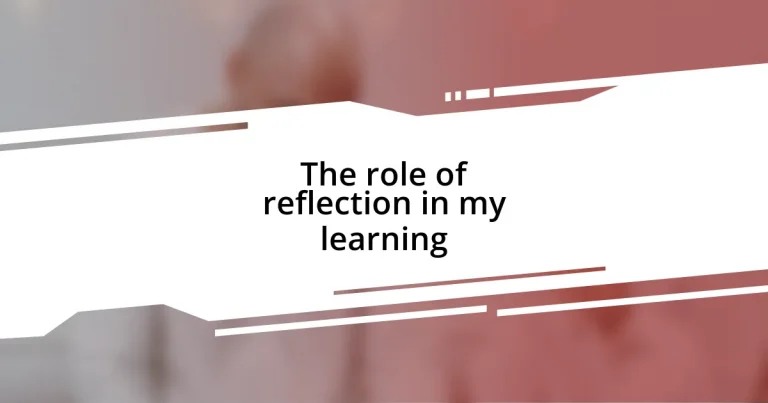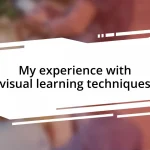Key takeaways:
- Reflection enhances learning by fostering self-awareness, problem-solving skills, and emotional regulation.
- Techniques for effective reflection include journaling, peer discussions, and guided questioning to deepen insights.
- Challenges in reflective learning can be overcome by scheduling dedicated reflection time and simplifying expectations for insights.
- Sharing reflections with a mentor or friend adds a social dimension and clarifies understanding, making the process more enriching.
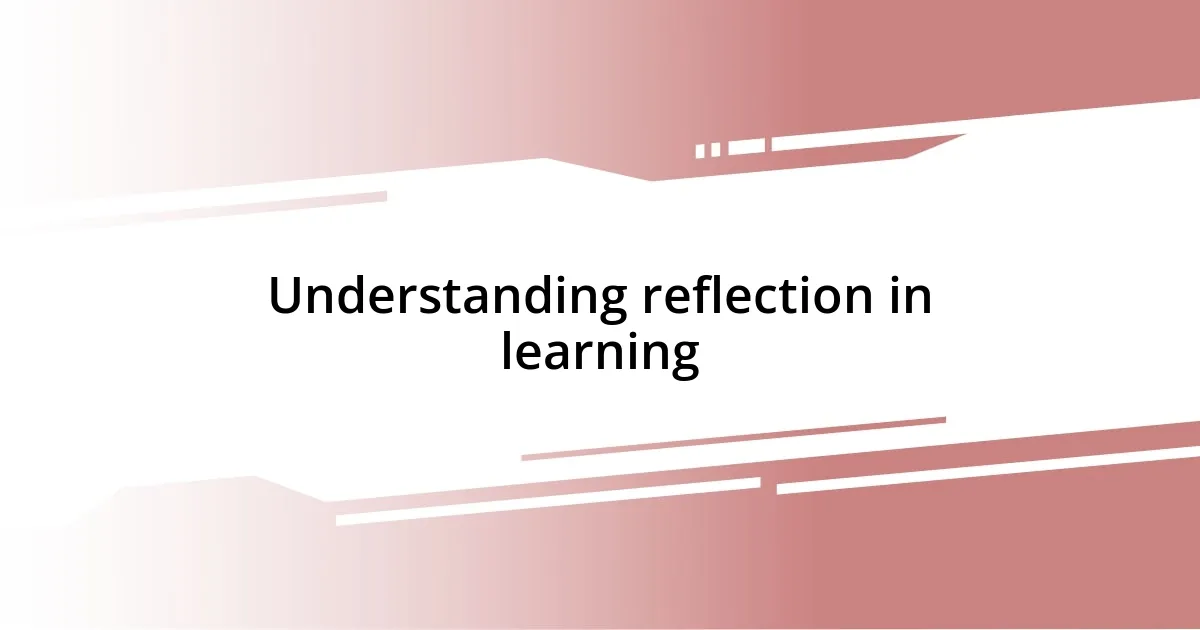
Understanding reflection in learning
Reflection in learning is a powerful tool that allows us to connect our experiences with our understanding. I remember a time in my early career when I faced a particularly challenging project; I took a step back to analyze what went wrong. It was through this process of reflection that I uncovered my own blind spots, ultimately leading to significant growth.
Have you ever found yourself stuck on a concept, only to realize later that a moment of contemplation could have offered clarity? I’ve been there. Each time I sit down to reflect after a learning session, I discover nuances in my understanding that I hadn’t noticed in the moment. This practice has transformed my learning process, emphasizing that reflection is not just an afterthought, but a stepping stone to deeper comprehension.
Another aspect of reflection in learning is its ability to foster emotional intelligence. When I took time to evaluate my reactions to feedback, I realized the importance of embracing constructive criticism. This not only enriched my learning but also built resilience – proving to me that reflection creates a pathway to progress, both intellectually and personally.
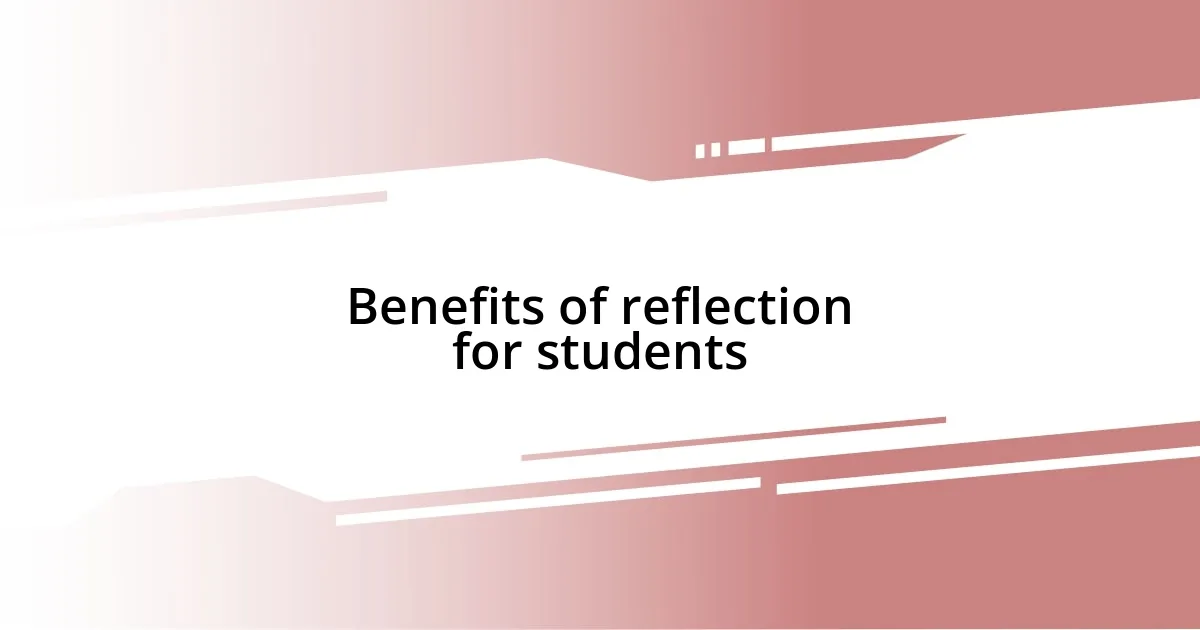
Benefits of reflection for students
Reflecting on my learning has led to some profound insights over the years. I remember a group project where I was hesitant to share my ideas. After the project, I took time to think about my silence and how it affected our outcomes. This reflection taught me the value of my voice in collaborative learning. It’s powerful to realize how our contributions—or lack thereof—can shape the experience.
The benefits of reflection for students are numerous and impactful:
- Enhanced self-awareness: Students gain a clearer understanding of their strengths and weaknesses, allowing for targeted improvement.
- Improved problem-solving skills: By reflecting on challenges, students develop effective strategies for overcoming obstacles.
- Increased motivation: Acknowledging progress through reflection can reignite a student’s passion for learning.
- Better emotional regulation: Reflecting on experiences helps students manage stress and anxiety, leading to a healthier mindset in their studies.
- Deeper learning: It encourages a more profound connection with the material, facilitating long-term retention.
When I took a moment to analyze a tough math concept, I not only grasped it better but also learned to appreciate the journey of learning itself. Reflecting transformed my relationship with learning from a chore into an exciting adventure.
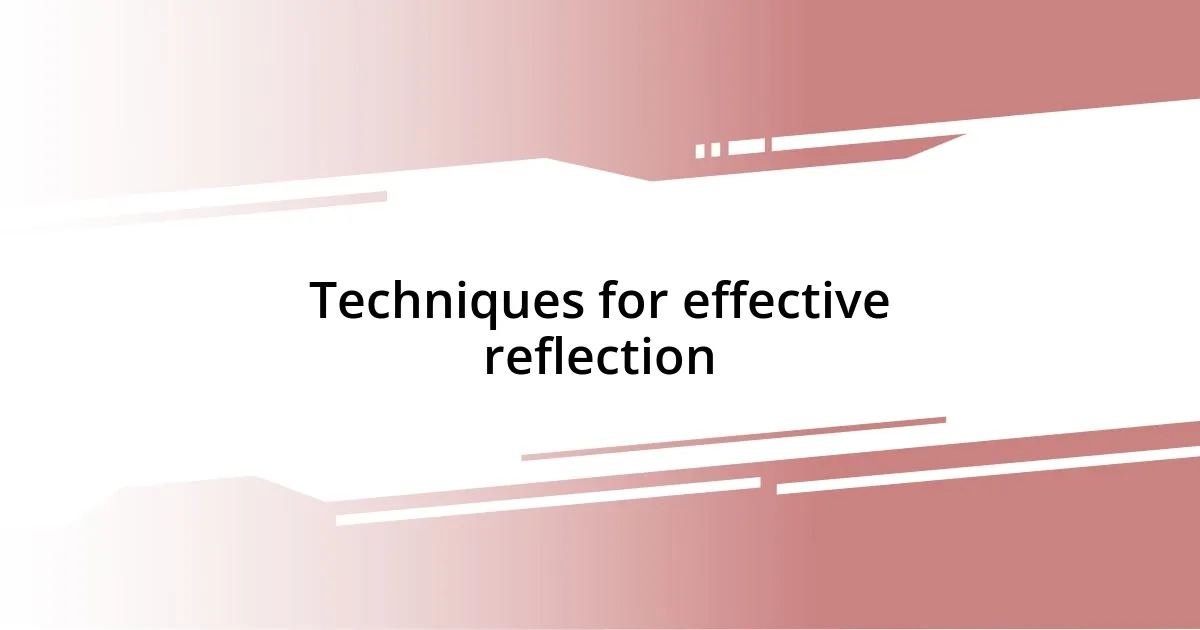
Techniques for effective reflection
One technique for effective reflection that I often find beneficial is journaling. When I jot down my thoughts after completing a task or lesson, I notice patterns emerge in my understanding. It’s like holding a mirror up to my learning journey, providing clarity on what I grasped and what needs further exploration. This daily practice not only grounds my thoughts but also makes it easier to track my progress over time.
Another powerful approach is to engage in peer discussions. I remember a time when I facilitated a group reflection session after a workshop. By sharing our experiences and questioning each other’s viewpoints, we unveiled new layers of insight. It was fascinating to see how someone else’s perspective could illuminate my blind spots, demonstrating that collaboration in reflection is incredibly enriching.
Lastly, I often employ the technique of asking myself guided questions. I’ve found that questions like, “What did I learn today that challenged my thinking?” or “How can I apply this knowledge in a different context?” direct my thoughts toward deeper insights. Developing a habit of questioning encourages a continuous dialogue with myself about my learning, helping me uncover valuable lessons that might otherwise go unnoticed.
| Technique | Benefits |
|---|---|
| Journaling | Enhances self-awareness, tracks progress, clarifies understanding. |
| Peer discussions | Provides diverse perspectives, deepens insights, fosters collaborative learning. |
| Guided questioning | Encourages critical thinking, uncovers lessons, promotes continuous learning. |
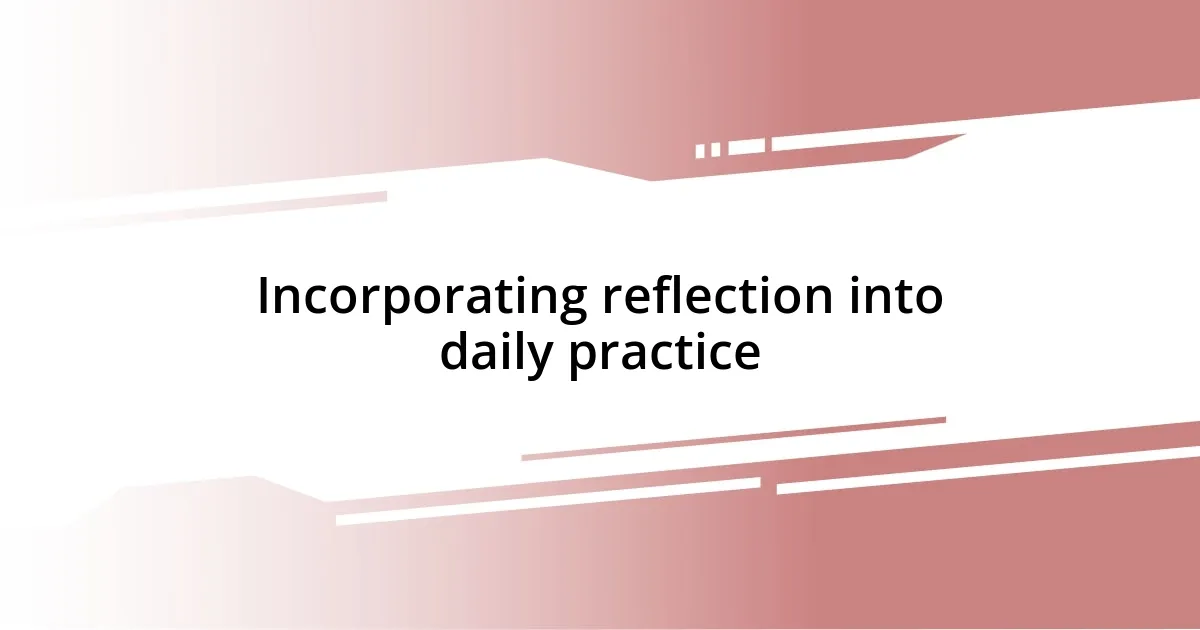
Incorporating reflection into daily practice
Incorporating reflection into my daily practice is a game-changer. I’ve started setting aside just five minutes each evening to think about my day. It’s astonishing how much clarity I gain from this small commitment. I often ask myself, “What moment stood out to me today, and why?” This simple question drives me to notice the nuances of my experiences, providing insights that might have otherwise slipped by unnoticed.
One day, I found myself reflecting on a challenging conversation with a colleague. At first, I felt frustrated and defensive. But as I contemplated the interaction, I recognized my triggers and how my emotions influenced my responses. This awareness reshaped my approach in future discussions, turning what could have been a repetitive cycle of misunderstandings into a learning opportunity. Have you ever paused to pinpoint the real reasons behind your reactions? It can lead to profound growth.
Another practice I embrace is setting intention for the next day before I go to bed. By visualizing my goals and anticipating potential challenges, I’m essentially creating a roadmap. I remember a particularly hectic week of exams; I began to lay out my intentions during my evening reflection. This habit not only eased my anxiety but also kept me focused on my priorities. It’s amazing how purposeful reflection can transform your mindset and daily outcomes.
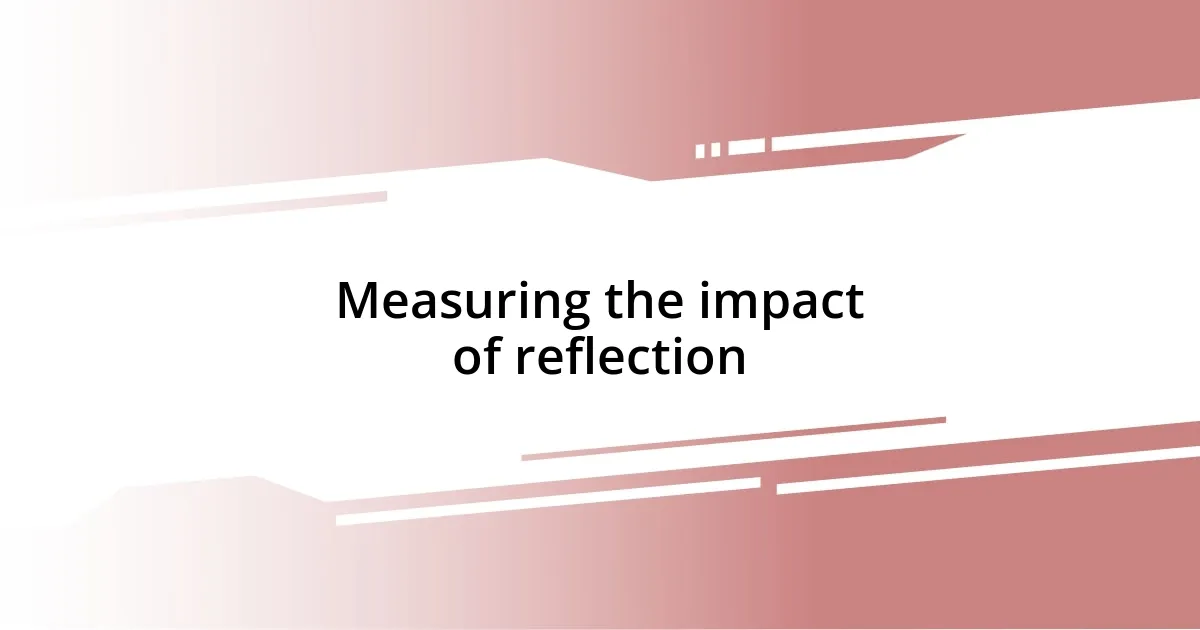
Measuring the impact of reflection
Measuring the impact of reflection can often feel intangible, yet I believe it manifests in various measurable ways. One of the clearest indicators for me has been my increasing ability to tackle challenges with greater confidence. For instance, after consistently reflecting on a difficult project, I noticed not just improvements in my performance but also in my resilience. Have you ever felt that moment when a previous struggle suddenly seems less daunting? It’s like the weight of uncertainty is lifted, revealing a clearer path forward.
In my experience, shifts in my emotional responses also highlight the impact of reflection. I recall a time when I took a moment to reflect on a mistake I made during a presentation. By analyzing my feelings of embarrassment and acknowledging them, I transformed that moment into a learning experience. Instead of shying away from future presentations, I found myself embracing opportunities with renewed vigor. Isn’t it fascinating how a few moments of contemplation can turn fear into motivation?
I’ve also noticed how my ability to retain information improves post-reflection. After a deep dive into a complex subject, I often summarize what I’ve learned in a simple format, akin to teaching someone else. This method has consistently yielded better recall and understanding—it’s like a light bulb moment every time. It leads me to ponder: how often do we miss out on deeper comprehension simply because we skip the step of processing our learning experiences?
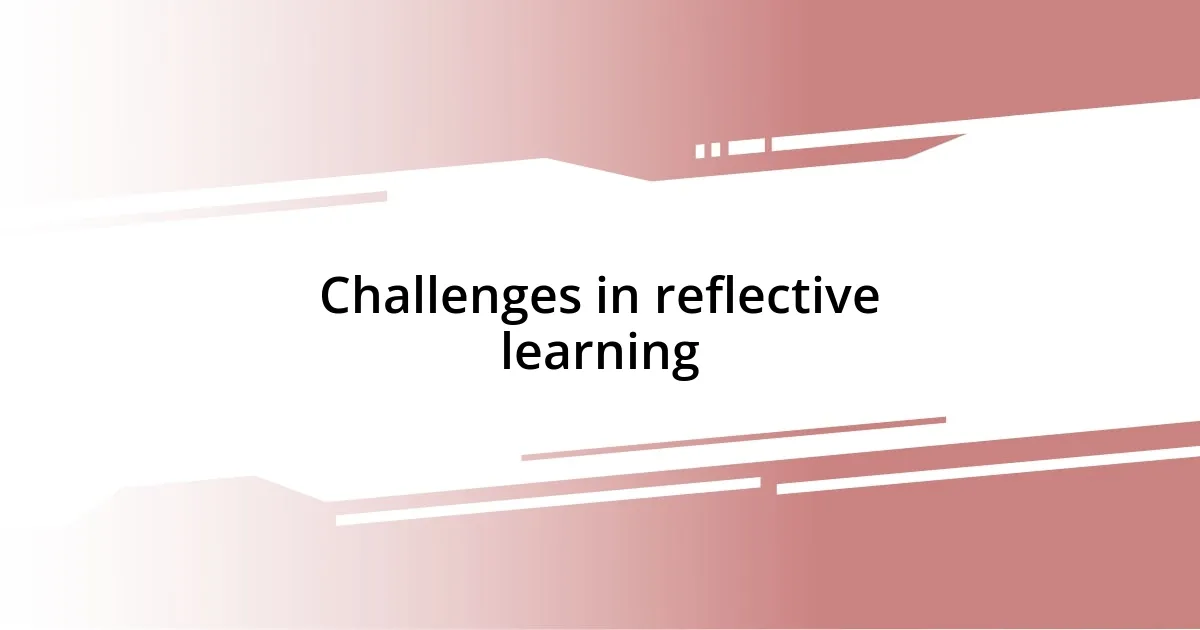
Challenges in reflective learning
Reflective learning isn’t always smooth sailing; I’ve faced my own set of challenges along the way. One significant hurdle is the hesitation to confront uncomfortable truths about myself. For instance, I once avoided reflecting on a project I’d poorly managed because facing my mistakes was daunting. But I soon realized that embracing those tough moments is essential for true growth. Have you ever caught yourself shying away from self-examination? The discomfort can be a powerful teacher if we allow it to be.
Another challenge I encounter is the inconsistency in my reflection practice. Some days, life gets busy, and I skip my evening reflection. I’ve noticed that when I neglect this habit, I become less aware of my thought patterns and emotional responses. It’s like setting a lighthouse aside during a storm — not ideal. When I fail to carve out that time, I miss out on valuable insights, leaving me feeling scattered. How do you maintain consistency in practices that nurture your growth?
Then there’s the pressure to reflect perfectly, which can be paralyzing. I remember one time I sat down to reflect and got stuck on overthinking every detail, losing sight of the overall lesson. Instead of clarity, I felt frustration. I’ve since learned that reflection doesn’t have to be meticulous; it’s about capturing the essence of the experience. How liberating would it be for you to view reflection as a conversation with yourself, rather than a chore? Embracing this mindset can transform how we engage with our learning.
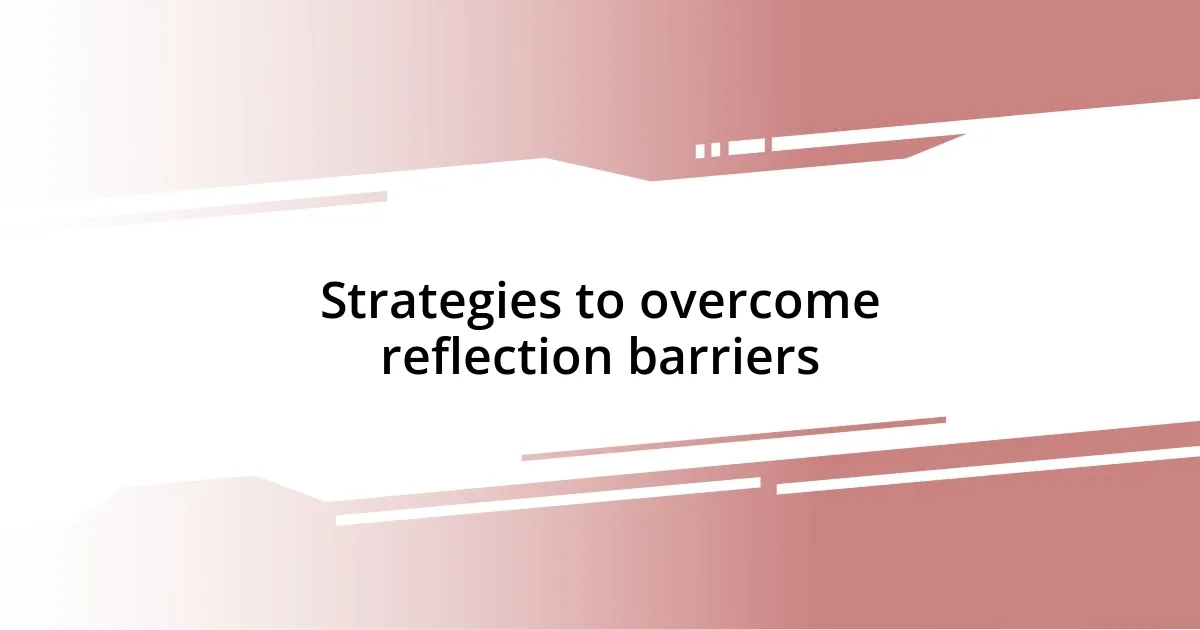
Strategies to overcome reflection barriers
One effective strategy I’ve discovered to overcome reflection barriers is to set specific, dedicated time slots for it. In my experience, I used to think I could reflect anytime, but life often got in the way. By blocking off just ten minutes each day, I realized I treated it like a priority rather than an afterthought. Have you tried scheduling reflection in your calendar? It might surprise you how such a small commitment can lead to significant insights.
Another hurdle I sometimes face is the overwhelming feeling that I need to identify multiple lessons from a single experience. Early on, I’d leave reflection sessions feeling frustrated, convinced I hadn’t done enough. I found it helpful to focus on just one or two key takeaways instead. By accepting that even minor insights are valuable, I foster a sense of accomplishment that encourages me to reflect again. Doesn’t it feel lighter when we simplify our expectations?
Additionally, sharing my reflections with a mentor or a trusted friend has proven invaluable. During one particularly challenging course, I found verbalizing my thoughts helped me clarify them, transforming my reflections into actionable steps. This practice not only strengthened my understanding but also added a social dimension to my learning journey. Have you considered discussing your reflections with someone who inspires you? It’s a game-changer!










